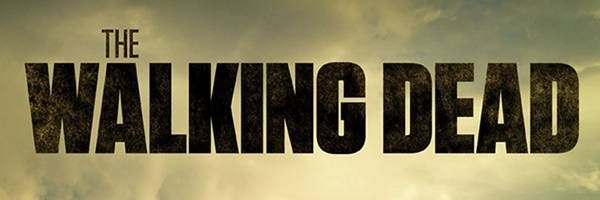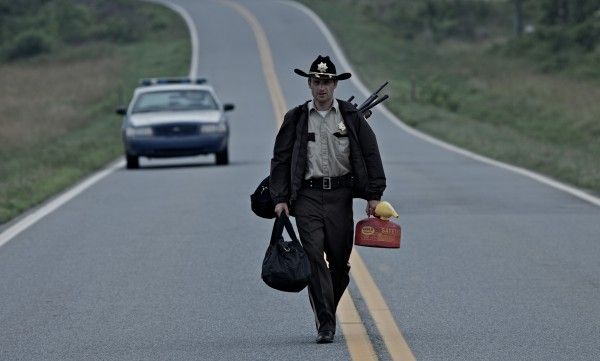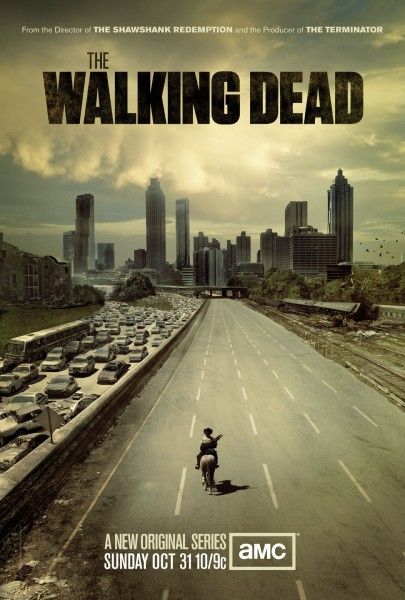The fact that a television series will be on the air focusing on the aftermath and survivors of a zombie apocalypse is an achievement in itself and a testament to the idea that the TV industry is in the middle of another Golden Age for the flickering box. Fortunately for viewers, the simple existence of such a series with AMC's adaptation of Robert Kirkman’s comic book series The Walking Dead isn't the only impressive quality of the series. Though the launch of the brand new series from Frank Darabont (The Mist, The Shawshank Redemption) has many familiar elements seen in countless zombie flicks before, it's our characters, their emotion, and the sheer human tragedy in such a devastating epidemic that hits the hardest. Find out how The Walking Dead injects new life into a recycled plot and genre below!
In the opening moments of the pilot titled "Days Gone By", the tone and style is set for the entire series. A haunting silence lies in the air as a uniformed police officer, possible a sheriff walks through streets and fields littered with abandoned, burned and wrecked cars. Gradually dead bodies become visible, and the flies that swarm buzz in and out. But this sheriff isn't concerned with the dead. He's just looking for some gas. But in his search, the silence in the air is broken by a nearby shuffle. Looking under one of the disheveled automobiles, the officer notices the feet of a young girl in some worn slippers. We can only see her from the back, but her pause to grab a stuffed bear relieves our tension. That is until the officer calls out to her, causing her to turn around and reveal her bloody and torn face. With great regret and remorse, the officer puts one bullet right in the center of her skull with a violent, bloody splatter. This is The Walking Dead.
Aisde from not being shy about blood (though at times the digital smattering of it looks a bit sloppy in the effects department), the series also isn't shy about retreading some familiar ground. After our title sequence, we find the hero of our opening shot back in a world unaffected by the walking dead. This is a time before the tragedy. Very quickly we learn our main protagonist is Deputy Rick Grimes (British TV actor Andrew Lincoln), but just as swiftly, he finds himself wounded in gunfight gone wrong and suddenly waking up in a hospital with no frame of reference for time. But losing track of the date is the least of his concern as he stumbles weakly out of his hospital bed and discovers the hospital in shambles. The grim sight of blood splatters, decayed, maybe eaten, bodies and no life in sight. That is until he stumbles upon a chained and blocked double-door with haunting and warning text painted, "Don't open. Dead inside." But what's inside doesn't seem the least but dead as quiet moans and dirty hands reach out from behind the doors.
Perhaps this isn't the most disturbing revelation upon Grimes waking though. As he finally makes his way outside he's left to the grisly discovery of the remnants of some sort of military rescue in shambles and truckloads of dead bodies wrapped in white sheets lying behind the hospital's loading dock. Moments like these will continue to define the rest of the pilot, and likely the series, as Frank Darabont isn't concerned with only tense chases, rushed escapes and cheap scares. He's concerned with his characters, their very lives and humanity being uprooted as everyone else's seems to have crumbled around them. Just before Grimes revelation outside of the hospital, plenty of tension builds as he finds himself walking down a pitch black stairwell with only a few matches lighting the way, leaving small bouts of darkness. In any normal horror director's hands, this scene would give way to a zombie suddenly appearing between the periods of light and dark only to lunge with an orchestral boom. But the only fear and scares we get are from our own minds anticipating the horror. And that's exactly how these characters, all the survivors we eventually meet, must feel every damn minute.
From here on out, we're given the usual run-around of small plot points teaching us about these walking dead. Some sort of fever takes over the body inducing death, but only temporarily as the infected are alive again in the least sense of the word. Grimes learns these brief bits as he encounters a father and son living in another family's house. They know what they're doing, and they've been doing it for awhile. But one of the biggest questions is just how long? We're given no timeframe as to how long Grimes was left unattended at the hospital, unconscious in his bed. But time is no matter at this point as Grimes is eager to find his wife Laurie and son Carl who seem to have vacated their house, and are hopefully alive at the usual rumored haven somewhere in downtown Atlanta.
If this all sounds like very zombie-centric story you've seen before, I don't blame you for maybe rolling your eyes and already expecting the exact opposite of a safe house in Atlanta. It doesn't matter. To really dig into this series you need to see and feel the quiet moments that have seemingly never been seen in any conventional zombie filled story before. While many zombie ridden films only have 90 minutes to 2 hours for us to care about our characters, gasp at their danger, jump at their fear, and rejoice at their survival, The Walking Dead is a series and has plenty of time to allow us more than a few breaths, and in those breaths we're given time to truly understand the weight of this tragedy and the decay of humanity on display. Grimes takes the time to marvel, albeit sadly, at a woman, (half of her anyway) crawling mindlessly, and reaching for Grimes just a foot away. When you have a limited time to spend on a story, and you're supposed to care about the living characters, you don't have time to care about the people these walking dead were before. But Grimes takes the time to look into her eyes and say, "I'm sorry that this happened to you." It's one of the most emotional scenes I've ever witnessed on television.
Without spoiling the rest of the pilot, just know that there are plenty more heart-wrenching scenes like this along with great moments of triumph, hope, and despite a lack of the usual cheap scares, some genuine moments of shock, suspense and fear. The Walking Dead isn't just another creature feature with zombies feasting on the living and people running, jumping and climbing trees to get away from them. This is a story about the human race and what happens to us when we have to literally look death in the face.
THE FINAL WORD: While it doesn't have outlandish mystery at its disposal, The Walking Dead just might be the series that will fill the void left by the conclusion of Lost. Unlike the crippled ensemble series The Event (which is a zombie of a TV series in itself), with Frank Darabont's opener we're given a story that is compelling, emotional and full of promise for a great series. Don't let the title fool you, because The Walking Dead is one of only a handful of new series that is actually full of life.



